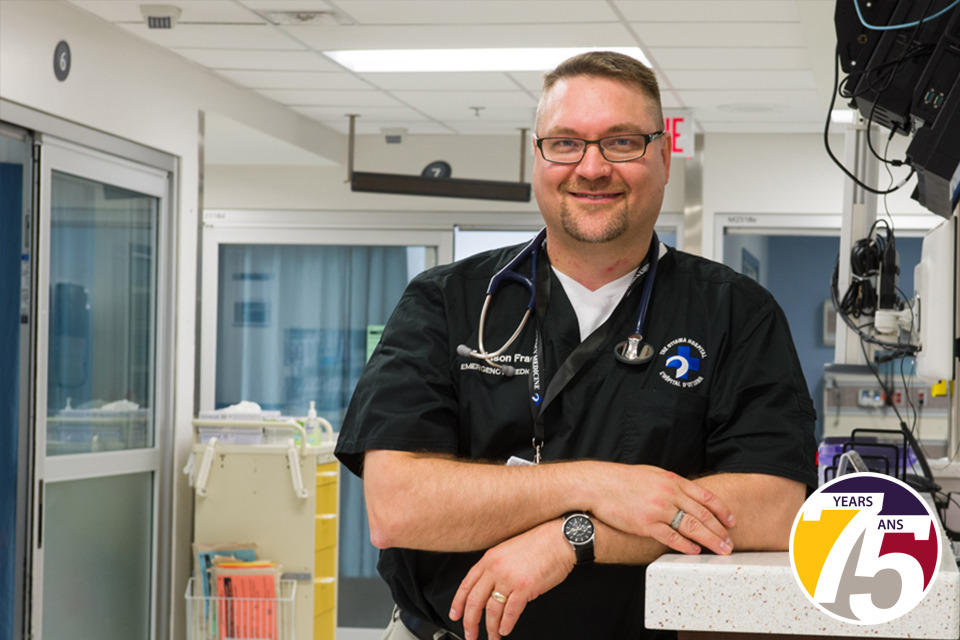By Michelle Read
Writer
The rows of books up to the ceiling behind Jason Frank’s head are very telling.
“Education is quite important in this house,” says Dr. Frank, a father of four, speaking via teleconference from his home in Ottawa.
As a child in remote Northern Ontario, Dr. Frank couldn’t have imagined he would become a national leader in medical education with an influence on millions around the world. He only knew he loved people and science, and he rode a bus an hour each way to get to school.
His travels led him south, ultimately to the University of Ottawa. He entered medical school in the 90s, a time when Frank says educators at the Faculty of Medicine were asking big questions about the education of learners.
The first-year class president found himself digging around at the library for answers and insight into how to adapt trainees’ learning to best suit the needs of the community.
“I was very much influenced by a movement in Ontario to re-align medicine with societal needs,” he says. “And really, the idea of service to our community has driven everything I’ve done ever since.”
Matching physician skills with public needs
A side job in research at the Royal College of Physicians and Surgeons of Canada (RCPSC) during his Master of Education was intended to simply pay his way through school. But he ended up leading a project that would soon influence millions of learners and propel him to global renown.
That little project was CanMEDS: a transformative framework of medical education now in use around the world. Rather than measuring learning by the amount of time spent in rotations, as had been done for over 100 years, Dr. Frank and his many co-authors proposed an approach focused on demonstrating essential competencies in physicians.
“Medical education should produce health professionals who are there to serve the public—and so their skills need to match the needs,” explains Dr. Frank, now an associate professor and director of educational research and development in the Department of Emergency Medicine at the uOttawa Faculty of Medicine.
Making change through a niche
This year, the Association for Medical Education in Europe (AMEE) presented Dr. Frank with the Ian R. Hart Award for Innovation in Medical Education, one of three major international prizes in the field. The award is a culmination of his 30-plus years of dedication to competency-based medical education, which all started with his work on CanMEDS.
“As a young med student looking to make my own contributions, I surrounded myself with mentors like Jeff Turnbull, John Seely and Ian Hart, who dedicated themselves to making sure doctors meet the needs of populations,” Dr. Frank says. “I eagerly soaked up their wisdom.” Changing a big system like medical education is like turning Titanic, he says, but he encourages people to find the intrinsic motivation of making the world a better place if only by an inch.
“Big changes are made up by many baby steps, and there is satisfaction in observing the little improvements,” he says.
Dr. Frank in turn inspires a passion in others. “We presented together in Chile several years ago,” says Dr. Marcio Gomes, associate professor in the Department of Medicine and himself a clinician-educator. “He radiated calm and generosity, which empowered my confidence, and I knew right away I wanted to continue my medical education journey alongside him.”
The proving ground of a pandemic
Nothing tests a medical learner’s competency more than a pandemic, something Dr. Frank appreciates as a clinician-educator and director of specialty education, strategy and standards at RCPSC.
“We decided residents needed to be exposed to working in the pandemic environment to develop the skills to be safe in their practice for years to come, and to be able to serve Canadians when the next one hits,” explains Dr. Frank, also an emergency physician at The Ottawa Hospital.
As vice-chair of his clinical department, he was central in organizing educators, clinicians and administrators to help revamp training in the face of COVID-19. “It was about finding innovative ways of doing things,” he says.
Dr. Frank believes COVID-19 has given us a peek into the future of medical education.
“Our students and residents will use PPE like never before, and be mindful of infectious disease like never before,” he says. “They will be very used to virtual teaching and much more accepting of alternative ways of delivering great education—I feel these tools are here to stay.”
The gospel of service
Active on Twitter, Dr. Frank describes himself as "all things #MedEd" and has 10,600 followers. He finds himself spreading the gospel of service to others—not only in his teachings, but as he raises his sons. “They’re good young men, and I like to ask them, what have they done for somebody else that day?”
When he looks back on his career, Dr. Frank says he’d like to think he nudged the world a little bit. Highly awarded, he remains humble, and values satisfaction over recognition.
“Medicine is a privilege, and serving others is why we are here,” he observes. “The joy of work is all about the patient in front of you.”
Main photo: Dr. Jason Frank speaks at the Department of Emergency Medicine Awards and Grad Dinner at the Westin in Ottawa in June 2019. Photo credit: Department of Emergency Medicine


